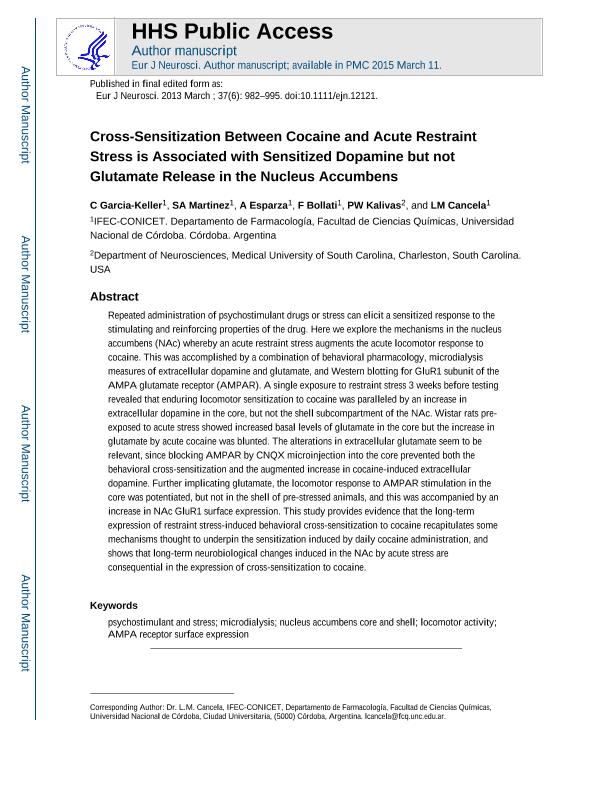Artículo
Cross-sensitization between cocaine and acute restraint stress is associated with sensitized dopamine but not glutamate release in the nucleus accumbens
Garcia Keller, Constanza ; Martinez, S. A.; Esparza, Maria Alejandra
; Martinez, S. A.; Esparza, Maria Alejandra ; Bollati, Flavia Andrea
; Bollati, Flavia Andrea ; Kalivas, P. W.; Cancela, Liliana Marin
; Kalivas, P. W.; Cancela, Liliana Marin
 ; Martinez, S. A.; Esparza, Maria Alejandra
; Martinez, S. A.; Esparza, Maria Alejandra ; Bollati, Flavia Andrea
; Bollati, Flavia Andrea ; Kalivas, P. W.; Cancela, Liliana Marin
; Kalivas, P. W.; Cancela, Liliana Marin
Fecha de publicación:
03/2013
Editorial:
Wiley Blackwell Publishing, Inc
Revista:
European Journal Of Neuroscience
ISSN:
0953-816X
e-ISSN:
1460-9568
Idioma:
Inglés
Tipo de recurso:
Artículo publicado
Clasificación temática:
Resumen
Repeated administration of psychostimulant drugs or stress can elicit a sensitized response to the stimulating and reinforcing properties of the drug. Here we explore the mechanisms in the nucleus accumbens (NAc) whereby an acute restraint stress augments the acute locomotor response to cocaine. This was accomplished by a combination of behavioral pharmacology, microdialysis measures of extracellular dopamine and glutamate, and Western blotting for GluR1 subunit of the α-amino-3-hydroxy-5-methyl-4-isoxazolepropionic acid (AMPA) glutamate receptor (AMPAR). A single exposure to restraint stress 3weeks before testing revealed that enduring locomotor sensitization to cocaine was paralleled by an increase in extracellular dopamine in the core, but not the shell subcompartment, of the NAc. Wistar rats pre-exposed to acute stress showed increased basal levels of glutamate in the core, but the increase in glutamate by acute cocaine was blunted. The alterations in extracellular glutamate seem to be relevant, as blocking AMPAR by 6-cyano-7-nitroquinoxaline-2,3-dione microinjection into the core prevented both the behavioral cross-sensitization and the augmented increase in cocaine-induced extracellular dopamine. Further implicating glutamate, the locomotor response to AMPAR stimulation in the core was potentiated, but not in the shell of pre-stressed animals, and this was accompanied by an increase in NAc GluR1 surface expression. This study provides evidence that the long-term expression of restraint stress-induced behavioral cross-sensitization to cocaine recapitulates some mechanisms thought to underpin the sensitization induced by daily cocaine administration, and shows that long-term neurobiological changes induced in the NAc by acute stress are consequential in the expression of cross-sensitization to cocaine..
Archivos asociados
Licencia
Identificadores
Colecciones
Articulos(IFEC)
Articulos de INST. DE FARMACOLOGIA EXPERIMENTAL DE CORDOBA
Articulos de INST. DE FARMACOLOGIA EXPERIMENTAL DE CORDOBA
Citación
Garcia Keller, Constanza; Martinez, S. A.; Esparza, Maria Alejandra; Bollati, Flavia Andrea; Kalivas, P. W.; et al.; Cross-sensitization between cocaine and acute restraint stress is associated with sensitized dopamine but not glutamate release in the nucleus accumbens; Wiley Blackwell Publishing, Inc; European Journal Of Neuroscience; 37; 6; 3-2013; 982-995
Compartir
Altmétricas



